BEIRUT (REUTERS) – THE path to a new Lebanese government is completely blocked, Parliament Speaker Nabih Berri said in comments published on Tuesday, but he held out hope that French President Emmanuel Macron might be able to help in a forthcoming visit. Fractious politicians have been unable to agree on a new government since the […]
BEIRUT (AP) — A military court in Lebanon on Monday sentenced a political activist to three years of hard labor for collaborating with Israel, Lebanon’s state-run news agency reported. The National News Agency said Kinda El-Khatib was sentenced for allegedly visiting Israel, contacting Israeli agents and providing them with security information. Lebanon and Israel are […]
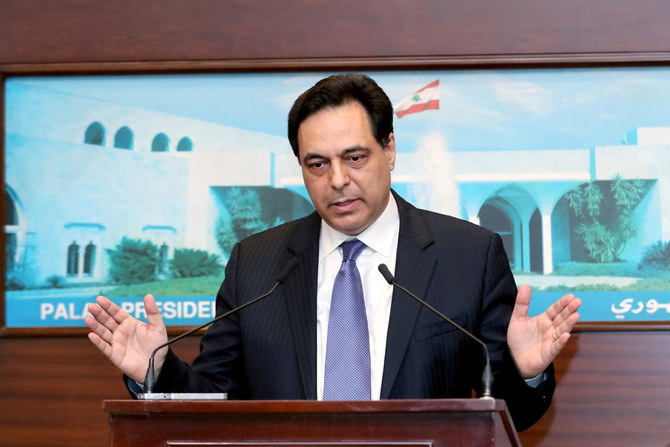
by NAJIA HOUSSARI — arabnews.com — BEIRUT: The judicial investigator of the Beirut port bombing has said he will interrogate caretaker Prime Minister Hassan Diab at 9 a.m. on Friday. The move means the judge has decided to proceed with his allegations against those accused of involvement in the explosion crime on Aug. 4, in which 202 people were killed. Judge Fadi Sawan was supposed to go to the Prime Minister’s office on Monday to interrogate Diab after he had charged him and 3 other ministers with “negligence causing the death and injury of hundreds of people.” The massive explosion of tons of ammonium nitrate injured more than 6,500 people and destroyed Beirut’s waterfront and entire residential neighborhoods.
Arab News learned from judicial sources that Judge Sawan also set next Friday as a date for the questioning of the former Minister of Public Works and Transport Ghazi Zaiter. On Tuesday, Judge Sawan is scheduled to question two defendants, a member of the Higher Council of Customs, Hani Hajj Shehadeh, and the former customs chief, Moussa Hazimeh. The former Minister of Finance, Ali Hassan Khalil, and the former Minister of Public Works and Transportation, Youssef Fenianos, is to be questioned on Thursday. Zaiter and Hassan Khalil said that they would not appear before Judge Sawan for questioning because “Sawan is violating constitutional principles.” The Prime Minister’s media office repeated Diab’s previous position, which “respects the constitution that has been violated by Judge Sawan.” On Monday, Diab resumed his job as usual in the Prime Minister’s office according to a schedule that did not include an appointment with Judge Sawan. Mohammed Fahmy, interior minister in the caretaker government, confirmed his rejection of “targeting the prime minister’s position in the Beirut port explosion case because of the consequences of a 7-year-old complicated file cannot be blamed on a prime minister who has only been in office for a few months.”
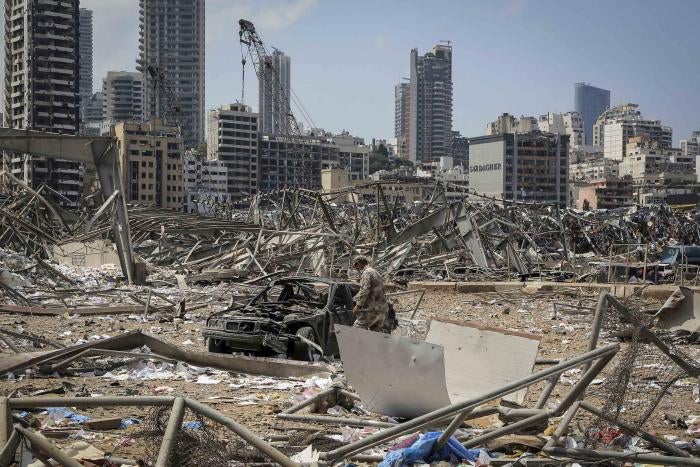
By Bénédicte Jeannerod — Aya Majzoub — hrw.org/news/ — Two days after the catastrophic August 4 explosion that devastated half of Beirut, Lebanon’s capital, and killed more than 200 people, President Emmanuel Macron walked through the city’s gutted streets. Surrounded by Beirut’s residents enraged over their leaders’ wanton disregard for their lives, Macron reassured them that, “I’m not here to help them, I’m here to help you.” Macron said all the right things. He promised that much-needed aid would not fall into corrupt hands, he called for an international investigation and warned that “the time for responsibility has arrived,” and he insisted on the importance of political and economic reforms. But almost four months later, there is hardly anything to show for Macron’s proclamations. Life for almost everyone in Lebanon has continued to get worse. More and more people are sliding into poverty, with over half the population struggling to afford basic necessities. The physical damage is still striking in the hardest-hit neighborhoods, scores of buildings are at risk of collapse, and thousands of families have still not been able to return home. Even though senior Lebanese political and security officials knew about the presence of recklessly stored ammonium nitrate in Beirut’s port, none have been held accountable yet in a domestic investigation riddled with due process violations and allegations of political interference.
Lebanon’s leaders have not even been able to form a government. Instead, the same political leaders conduct business as usual and prioritize sectarian and clientelist considerations while the country falls apart. Unfortunately, anyone in Lebanon could have told Macron that betting that the same political elite who have been robbing the country would carry out reforms that weakened their stranglehold wasn’t going to happen — at least not without tremendous domestic and international pressure. It is crucial that Macron doesn’t jettison his ambitious Lebanon plan as a “risky bet” that didn’t pay off. Releasing the pressure on Lebanon’s leaders now risks emboldening the corrupt political system – which France helped establish throughout history – and lends credence to these leaders’ claims that there is no alternative. It also risks further disillusioning an angry, disenfranchised citizenry who are increasingly choosing to emigrate as they lose hope for a better future in the country. If Macron really wants to help the Lebanese people, he needs to take the punitive measures on those Lebanese leaders responsible for ongoing abuses that he promised in September and mobilize broader international support for them, including from the US and EU.

by arabnews.com — NAJIA HOUSSARI — BEIRUT: As the UN hosted a second International Conference on Assistance and Support to Beirut on Wednesday, there was growing impatience among donors with Lebanese politicians. The virtual event, chaired by French President Emmanuel Macron and UN Secretary-General António Guterres, aimed to coordinate international aid efforts in support of the Lebanese people as the country continues to face political, economic and social challenges. The participants — including heads of state, international organizations, donors, NGOs and civil-society representatives — discussed the results of the first conference, which was organized by France after the Beirut port explosion and held on Aug. 9. It resulted in pledges of aid worth about $300 million in a fund managed by the World Bank that will be channeled through UN agencies and NGOs rather than Lebanese state institutions. However, delegates expressed impatience with the failure of political factions in Lebanon to resolve their differences and work together for the good of their country. Four months after the Aug. 4 explosion in Beirut, and the subsequent resignation of Hassan Diab’s government, a new government has yet to be formed, delaying the economic and political reforms needed to begin efforts to resolve the financial crisis.
According to Reuters, the French presidency on Wednesday said: “No measures required in the French road map for Lebanon have been implemented and the Lebanese Central Bank’s accounts haven’t been audited.” It added: “American sanctions imposed on the Lebanese political class have not had any effect so far and will not help in forming a government.” This came after the leak of a conversation in which Dorothy Shea, the US ambassador to Lebanon, asked Nabih Berri, speaker of the Lebanese parliament, to “distance himself from Hezbollah.” She also hinted that “Washington will reject any government in which Hezbollah is represented and there won’t be any foreign aid without radical change.”
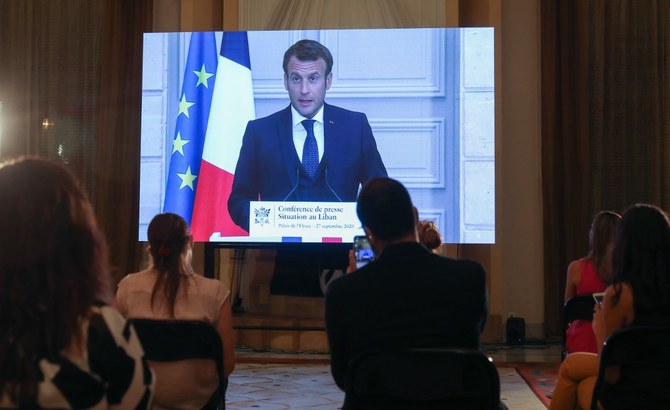
by HAFED AL-GHWELL — arabnews.com — Despite external and domestic pressure to form a new Lebanese government, endless jockeying for key ministerial posts continues while the country remains on a slow path to implosion. If it is not the financial crisis that wiped out savings, it is an economic crisis that has decimated jobs and the viability of most small businesses. If it were not the Aug. 4 port blast that made thousands of homes uninhabitable and shut down hundreds of businesses, it is a pandemic that has shattered mobility and overwhelmed a dismal public health system. If it is not the governance crisis that has eroded confidence in political leadership, it is worsening sectarian fragmentation justifying a defense of the status quo instead of efforts to secure a future all Lebanese can share. All these issues affect every Lebanese regardless of age, sect, religion, status, political affiliation, level of education or any other demographic division. Yet surprisingly, there is little momentum and even less political will to find solutions.
Decades of close French-Lebanese ties have placed Paris at the forefront of developments in Lebanon’s political leadership. Virtual donor meetings are reminiscent of the post-civil war aid conferences; now, as then, funds will vanish, without any reforms against a backdrop of further civil unrest. Granted, French President Emmanuel Macron’s carrot of funding in exchange for reform does indicate wariness of a repeat of the 1990s post-civil war reconstruction fiasco if the same faces remain in power. Unfortunately, the changes Macron seeks are doomed to fail given the glacial pace of Lebanese governance crippled by incessant political wrangling. No carrot or stick can guarantee the Lebanese political elite will implement the desperately needed reforms in governance, finance, politics and the economy. Demanding the formation of a government of independent technocrats, however, necessary, will simply exacerbate gridlock and political wrangling. The same applies to calls for judiciary reforms and a commitment to elections within a year under new election laws. They run counter to how Lebanon’s political “old guard” have consistently tied their legitimacy and fortunes to how much political power they can wield in defense of their own interests.

by Washington – Elie Youssef — aawsat.com/ — American sources revealed that they had from the start believed that the border negotiations between Lebanon and Israel would not reach any tangible results. The sources, which were in contact with the State Department team that sponsored the negotiations, said that the talks were “hastily” arranged. They revealed that they had urged the team against being hasty in launching the negotiations months before the American election. The team had sought a “political victory” in beginning the marine border talks, but the Trump administration’s defeat in the election means that it will not be employed for any political gain. Moreover, the sources said the team failed in understanding the “mentality” of the Lebanese side of the negotiations. They explained that they underestimated the reasons that could motivate the Lebanese to “accept any settlement that could help them resolve their crippling economic crisis.”
Indeed, the reality on the ground showed that the ruling Lebanese class does not care in the slightest about easing the crisis and is happy to leave the country in the hands of an armed group – Hezbollah – that is following a non-Lebanese agenda. “It was evident that the Lebanese negotiators will not offer a free gift” to Trump when he leaves office, said the sources. They would rather offer it to Joe Biden’s administration amid Iran’s hopes that it could salvage the 2015 nuclear deal or end US economic sanctions against it, they continued.
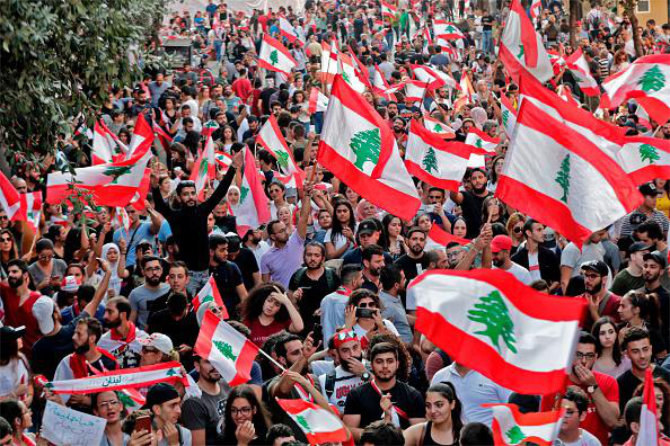
By NAJIA HOUSSARI – arabnews.com — BEIRUT: Lebanese Army troops were deployed near the home of parliamentary Speaker Nabih Berri on Saturday as protesters targeted people they believe are a “privileged elite.” Groups of demonstrators have followed political and economic leaders into restaurants and cafes to protest and accuse them of theft. They include former minister Adnan Kassar, the wife of the governor of the Banque du Liban, Nada Riad Salameh, and the secretary-general of the Future Movement, Ahmad Hariri. There was further anger on Saturday when video footage emerged of bodyguards for Hariri, cousin of Prime Minister-designate Saad Hariri, apparently attacking protesters inside an upmarket Italian restaurant in Beirut. Twitter user Usamaibn Munqid said: “The whole Lebanese political elite needs to be jailed whether it is Hariri, Aoun, Berri and many more.”
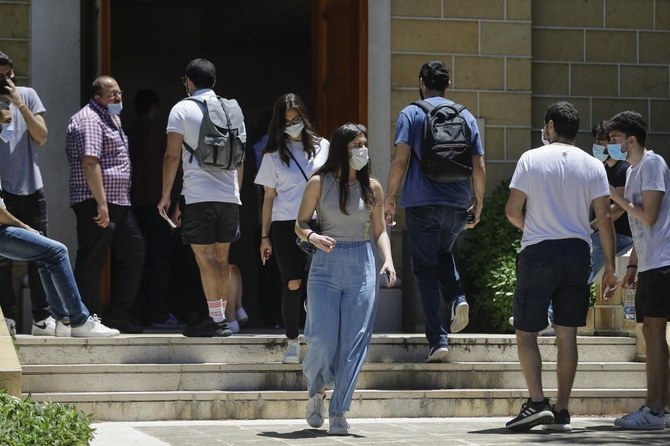
by NAJIA HOUSSARI — arabnews — BEIRUT: Student movements at Lebanese universities and independent civic groups are reorganizing themselves with the goal of changing the ruling authority in Lebanon. Secular and independent clubs affiliated with the Mada network in Lebanon’s universities launched the “Declaration of Lebanese Students” on Saturday, in light of “the unprecedented risks threatening students, especially the crisis of the dollarization of tuition fees.” That dollarization has seen tuition fees start to massively increase at institutions across the country, following decisions to adopt the Lebanese Central Bank’s new exchange rate of 3,900 Lebanese pounds to the dollar. The American University of Beirut (AUB) saw its tuition costs increase 160 percent alone as a result. Lebanon has been in the grip of a currency crisis ever since the pound, previously pegged at 1,500 to the dollar, began to devalue rapidly as a consequence of political and economic mismanagement, blamed by many on the country’s elite. Student elections at a number of private universities in Lebanon resulted in a series of unprecedented victories for independents, especially secular representatives, on representative councils this year, after decades of being held by students from the country’s ruling parties.
The representative of the Secular Club at Saint Joseph University, student Charbel Shaya, said: “The independent, unified student movement has turned the tables after student representation was confiscated by parties in power. I believe that networking between us has led to achievement, and the time has come to fight the battle of refusing the dollarization of tuition fees as a prelude to rejecting what the parties committed against us as people.” Qamar Suleiman, a medical student at the University of Balamand, said: “Political awareness in universities is one of the means for change. Politics controls the corners of our lives, and engaging in student elections is a step toward creating independent secular groups that believe in social justice to improve student life and protect their rights. “We want to impose a truly progressive and clear political discourse that establishes grounds for individuals capable of practicing political life in a sound manner after graduation,” he added. “The parties in power make us pay for things that we did not commit, but rather they did.” Manal Suleiman, an engineering student at Notre Dame University, said: “Universities are the ones that should fear their students, just as governments should fear their people. Students today are reclaiming their role through independent student movements that aim for change.” And Jad Al-Hani, from the AUB, said: “The retreat of the (main) parties in the student elections at the university was a declaration of defeat. The first battle we will fight is the battle against dollarizing tuition fees. We are headed toward an escalation in the coming days.”
BEIRUT (AP) Zeina Karam — Top Lebanese politicians and the militant Hezbollah group rallied on Friday against charges of negligence levelled against the caretaker prime minister and three former ministers over the massive explosion in Beirut’s port, underscoring the enormous difficulties facing the investigation. Hezbollah called on investigating judge Fadi Sawwan to reconsider the charges, calling them “political targeting” and saying they lacked legal and constitutional basis. Similar criticism was voiced by Prime Minister-designate Saad Hariri, who visited the accused caretaker Premier Hassan Diab — a political foe — in a gesture of solidarity. Lebanon’s grand mufti, the top cleric for Sunni Muslims, said the charges are an attack on “the office of the prime minister” and were a violation of the constitution. The prime minister in Lebanon must be a Sunni Muslim, according to the country’s sectarian-based power-sharing system.
The four are the most senior officials to be charged in the investigation and are set to be questioned as defendants next week by Judge Sawwan. It was not clear whether the criticism could have an impact on the investigation — or the charges— but the united front was seen by many as an attempt to block a precedent that might lead to accountability on a high level. A culture of impunity has prevailed in Lebanon for decades, including among the entrenched political elites. It has also fostered widespread corruption that has helped plunge Lebanon into the worst economic and financial crisis in its history. “What is happening now can be summed up in four words: Gangs defending each other,” tweeted Riad Kobaissi, an investigative journalist who has followed corruption at Beirut port. In a stunning move, Judge Sawwan filed the charges against Diab and three former ministers on Thursday, accusing them of negligence that led to the death of hundreds of people in the catastrophic explosion in August. At this point, however, it is far too early to say if any of the four will actually face trial. Diab, who is supported by Hezbollah and its political allies, resigned in the wake of the Aug. 4 blast but remains in his post in a caretaker capacity, as Lebanese officials have failed to agree on a new Cabinet.




